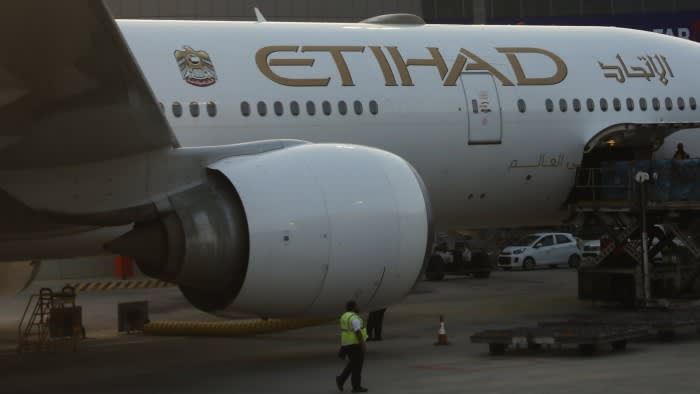Unlock the Editor’s Digest for free
Roula Khalaf, Editor of the FT, selects her favourite stories in this weekly newsletter.
Etihad Airways is hoping to take advantage of congestion at Dubai airport to win new business for its Abu Dhabi home base, in the fiercely competitive market for long-haul flights routed through the Gulf.
The airline wants to more than triple passenger numbers to 30mn by 2030, up from 13mn last year, by attracting more people to break their long-haul flights with a stopover in Abu Dhabi.
Etihad, which is owned by Abu Dhabi’s sovereign wealth fund, mainly competes on long-haul flights with Emirates, Qatar Airways and Turkish Airlines. All four are expanding, though Etihad remains the smallest. Saudi Arabia is also planning to launch an airline next year.
Etihad’s chief executive Antonoaldo Neves told the Financial Times that there was plenty of room and demand for Abu Dhabi to expand its aviation industry.
“From an airline perspective, Dubai is really congested right now. There is not a lot of capacity left in Dubai, and . . . the UAE now has Abu Dhabi to grow,” he said.
Dubai International airport, which is an hour’s drive from Abu Dhabi, handled 87mn passengers in 2023. Executives at its biggest airline Emirates have said it could soon run out of space there. A new airport capable of handling up to 230mn people a year is being built but will not be open for years.
Since he was appointed in 2022, Neves has steered away from direct competition with Emirates and Qatar Airways on “ultra-long-haul” flights that link cities like New York and Sydney via one stop in the Gulf.
“That’s not my fight . . . other airlines like Emirates do it very well,” he said.
Instead, Etihad has focused on opening up new markets, putting on multiple flights a day to destinations such as Mumbai, Oman and Riyadh that are between four and five hours from Abu Dhabi.
Neves said he was confident that a global shortage of aircraft and spare parts means there is little danger of overexpansion.
“Impossible, there are no planes,” he said. “The market is so artificially constrained . . . I was at a conference today and a guy said: can you sell me a plane?”
Etihad’s owner ADQ is considering listing the airline via an initial public offering in Abu Dhabi. Neves said there wee “pros and cons to any listing”, but that the airline’s $7bn expansion plan was not reliant on external capital.
“I need to be ready. That’s driven by management. The time of the IPO is driven by the shareholder. Because we don’t need cash,” he said.
Airlines flying into the Middle East have cancelled some flights to Beirut and Tel Aviv in recent weeks as the conflict between Israel and Hizbollah in Lebanon has escalated.
Neves said the airline, which has suspended flights to Beirut, relied on its own risk assessments and external intelligence when deciding whether it was safe to run flights.
“It is a process which is common in most airlines. But each has a different perception of risk,” he said.


